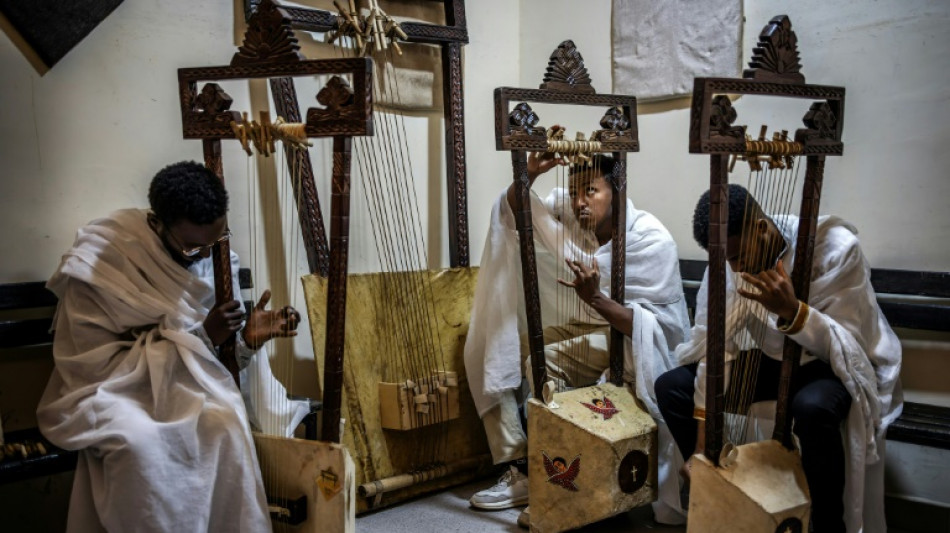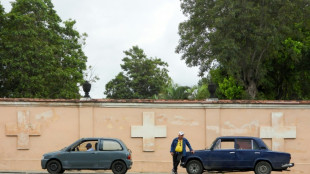
-
 Ship ahoy! Prague's homeless find safe haven on river boat
Ship ahoy! Prague's homeless find safe haven on river boat
-
Britain's Starmer ends China trip aimed at reset despite Trump warning

-
 Carlos Alcaraz: rare tennis talent with shades of Federer
Carlos Alcaraz: rare tennis talent with shades of Federer
-
Novak Djokovic: divisive tennis great on brink of history

-
 History beckons for Djokovic and Alcaraz in Australian Open final
History beckons for Djokovic and Alcaraz in Australian Open final
-
Harrison, Skupski win Australian Open men's doubles title

-
 Epstein offered ex-prince Andrew meeting with Russian woman: files
Epstein offered ex-prince Andrew meeting with Russian woman: files
-
Jokic scores 31 to propel Nuggets over Clippers in injury return

-
 Montreal studio rises from dark basement office to 'Stranger Things'
Montreal studio rises from dark basement office to 'Stranger Things'
-
US government shuts down but quick resolution expected

-
 Mertens and Zhang win Australian Open women's doubles title
Mertens and Zhang win Australian Open women's doubles title
-
Venezuelan interim president announces mass amnesty push

-
 China factory activity loses steam in January
China factory activity loses steam in January
-
Melania Trump's atypical, divisive doc opens in theatres

-
 Bad Bunny set for historic one-two punch at Grammys, Super Bowl
Bad Bunny set for historic one-two punch at Grammys, Super Bowl
-
Five things to watch for on Grammys night Sunday

-
 Venezuelan interim president proposes mass amnesty law
Venezuelan interim president proposes mass amnesty law
-
Rose stretches lead at Torrey Pines as Koepka makes cut

-
 Online foes Trump, Petro set for White House face-to-face
Online foes Trump, Petro set for White House face-to-face
-
Seattle Seahawks deny plans for post-Super Bowl sale

-
 US Senate passes deal expected to shorten shutdown
US Senate passes deal expected to shorten shutdown
-
'Misrepresent reality': AI-altered shooting image surfaces in US Senate

-
 Thousands rally in Minneapolis as immigration anger boils
Thousands rally in Minneapolis as immigration anger boils
-
US judge blocks death penalty for alleged health CEO killer Mangione

-
 Lens win to reclaim top spot in Ligue 1 from PSG
Lens win to reclaim top spot in Ligue 1 from PSG
-
Gold, silver prices tumble as investors soothed by Trump Fed pick

-
 Ko, Woad share lead at LPGA season opener
Ko, Woad share lead at LPGA season opener
-
US Senate votes on funding deal - but shutdown still imminent

-
 US charges prominent journalist after Minneapolis protest coverage
US charges prominent journalist after Minneapolis protest coverage
-
Trump expects Iran to seek deal to avoid US strikes

-
 US Justice Dept releases documents, images, videos from Epstein files
US Justice Dept releases documents, images, videos from Epstein files
-
Guterres warns UN risks 'imminent financial collapse'

-
 NASA delays Moon mission over frigid weather
NASA delays Moon mission over frigid weather
-
First competitors settle into Milan's Olympic village

-
 Fela Kuti: first African to get Grammys Lifetime Achievement Award
Fela Kuti: first African to get Grammys Lifetime Achievement Award
-
Cubans queue for fuel as Trump issues oil ultimatum

-
 'Schitt's Creek' star Catherine O'Hara dead at 71
'Schitt's Creek' star Catherine O'Hara dead at 71
-
Curran hat-trick seals 11 run DLS win for England over Sri Lanka

-
 Cubans queue for fuel as Trump issues energy ultimatum
Cubans queue for fuel as Trump issues energy ultimatum
-
France rescues over 6,000 UK-bound Channel migrants in 2025

-
 Surprise appointment Riera named Frankfurt coach
Surprise appointment Riera named Frankfurt coach
-
Maersk to take over Panama Canal port operations from HK firm

-
 US arrests prominent journalist after Minneapolis protest coverage
US arrests prominent journalist after Minneapolis protest coverage
-
Analysts say Kevin Warsh a safe choice for US Fed chair

-
 Trump predicts Iran will seek deal to avoid US strikes
Trump predicts Iran will seek deal to avoid US strikes
-
US oil giants say it's early days on potential Venezuela boom

-
 Fela Kuti to be first African to get Grammys Lifetime Achievement Award
Fela Kuti to be first African to get Grammys Lifetime Achievement Award
-
Trump says Iran wants deal, US 'armada' larger than in Venezuela raid

-
 US Justice Dept releases new batch of documents, images, videos from Epstein files
US Justice Dept releases new batch of documents, images, videos from Epstein files
-
Four memorable showdowns between Alcaraz and Djokovic


Ethiopia's ancient instrument begena healing souls
Biruktawit Tasew's fingers glide over the strings of the begena, producing a deep, hypnotic sound. Along with six fellow musicians, she breaks into a solemn religious melody, holding their audience spellbound.
One of the country's oldest instruments, the begena was once reserved for the elite -- and effectively banned during the Marxist Derg regime between 1974 and 1991.
But it is experiencing a resurgence among Ethiopia's artistic community.
For the past three years, Biruktawit's group has visited a nursing home in Addis Ababa every Friday to play for its residents.
The begena "is medicine for the soul," said Biruktawit, 23, who has been playing the instrument for about a year.
Legend has it that the instrument was brought over from Israel in the 10th century BC by Menelik I, Ethiopia's first emperor, who received it from King David.
For centuries, the instrument's music has accompanied the prayers and meditations of monks of the Ethiopian Tewahedo Church, which represents about 40 percent of Ethiopia's 120 million people.
That association with religion meant it fell from favour as the country turned towards communism in the 20th century, but it has slowly returned.
Resembling a harp or a large lyre, trapezium-shaped and about a metre tall, it has 10 strings —- traditionally made from sheep's intestines -- that symbolise the Ten Commandments.
It is plucked with the left hand, either bare or with a plectrum, while players wear a netela -- a traditional white cloth -- draped across the chest for men, and in the form of a veil for women.
- Begena therapy -
At Grace Nursing Home for the elderly, the begena brings healing.
Sitting in a small courtyard where residents gather to listen to the soothing melodies, 60-year-old Solomon Daniel Yohanes gently shakes his head in his wheelchair as the tunes fill the air.
Yohanes has been a resident for two years and said the begena has "brought him peace".
"When you're looking for God, you look for him in different ways, and I see the begena as God speaking in his own voice," he said.
Natnael Hailu, a doctor and co-founder of the institution, admits to being "shocked" to see his patients "forget their pain and drift into sleep" to the tune of the instrument.
"It calms their heart rate, lowers their blood pressure and soothes them. More than any other instrument, begena therapy has a real calming effect," he said.
Gene Bukhman, a cardiologist and lecturer at Harvard University who attended one of the performances, told AFP the begena's melodies could have a positive influence on people suffering from chronic illnesses.
- Positive influence -
Ermias Haylay, now 23, started playing the begena when he was 15.
He was not immediately convinced: "I found it smelled bad since some parts come from sheep," he said.
But he soon came to love its "spiritual aspect" and founded a school to train students in the ancient instrument.
It was his idea to play the begena in retirement homes and hospitals -- he even plays during surgeries -- hoping to entertain patients and "bring them a bit of joy".
Before long, he noticed "extraordinary changes" in patients with Alzheimer's, dementia and autism.
"They became very calm," he said.
Demands for the lessons have been booming and he hopes to open schools around the world to help more patients.
A.Taylor--AT




